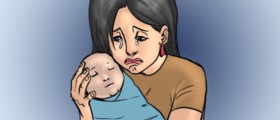
Antidepressants are the one treatment for any depression that is most likely to be effective. There is a wide range of antidepressant medications available. If you and your doctor have decided that this type of medication is the way to go, you may be prescribed the drug that works for you right away or you may need to try a few different ones before you find the antidepressant that works for you. Do keep in mind that breastfeeding mothers might pass any drugs they take onto their baby through their milk. Some antidepressant medications can be used by nursing mothers with a relatively small risk of side effects for their baby, so discuss this with your doctor in detail.
Another alternative is estrogen replacement therapy. Because estrogen levels drop suddenly after you give birth, some medical professionals think that this could be one of the reasons behind PPD. Unfortunately, not much research has been conducted into the benefits and effectiveness of estrogen replacement therapy for treating postpartum depression. Deciding to try if estrogen replacement works for you will require some research on the pros and cons, as well as a discussion with your doctor. Postpartum depression should get better after a few months, with the help of the appropriate medications. You may need therapy in addition to antidepressants, so ask your doctor about referring you to a counselor as well.

















Your thoughts on this
Loading...